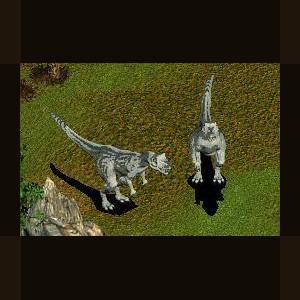About This File
Giganotosaurus (meaning 'giant southern lizard', derived from the Ancient Greek gigas meaning 'giant', notos meaning 'south wind' and saurus meaning 'lizard') was a genus of carcharodontosaurid dinosaur that lived 93 to 89
Giganotosaurus carolinii was named for Ruben Carolini, an amateur fossil hunter, who discovered the fossils in the deposits of the Rio Limay Formation of Patagonia, southern Argentina, in 1993. It was published by Rodolfo Coria and Leonardo Salgado in the journal Nature in 1995.
The holotype specimen's (MUCPv-Ch1) skeleton was about 70% complete and included the skull, pelvis, leg bones and most of the backbone. It is estimated around 12.2-12.5 m (40-41 ft) in length. A second specimen , 8% larger, has also been recovered. This largest Giganotosaurus specimen is estimated to represent an individual 13.2 m (43.3 ft) long, that weighed 6.2 tons. Giganotosaurus might have had the longest known skull for a theropod dinosaur, with the holotype's skull estimated at 1.80 m (6 ft) and the second specimen's estimated at 1.95 m (6.3 ft).[6] Giganotosaurus surpasses Tyrannosaurus rex in length by almost a meter (the upper length estimate for T. rex is 13 m).
Giganotosaurus, along with relatives like Tyrannotitan, Mapusaurus and Carcharodontosaurus, are members of the carnosaur family Carcharodontosauridae. Both Giganotosaurus and Mapusaurus have been placed in their own subfamily Giganotosaurinae by Coria and Currie in 2006 as more carcharodontosaurid dinosaurs are found and described, allowing interrelationships to be calculated
G. carolinii was slightly larger than T. rex but had a much smaller brain that was the size and shape of a banana. Its teeth were built more for cutting and slicing rather than crushing bones. A well-developed olfactory region means that it probably had a good sense of smell. Its skull, although large, had a slender build.



Recommended Comments
Create an account or sign in to comment
You need to be a member in order to leave a comment
Create an account
Sign up for a new account in our community. It's easy!
Register a new accountSign in
Already have an account? Sign in here.
Sign In Now